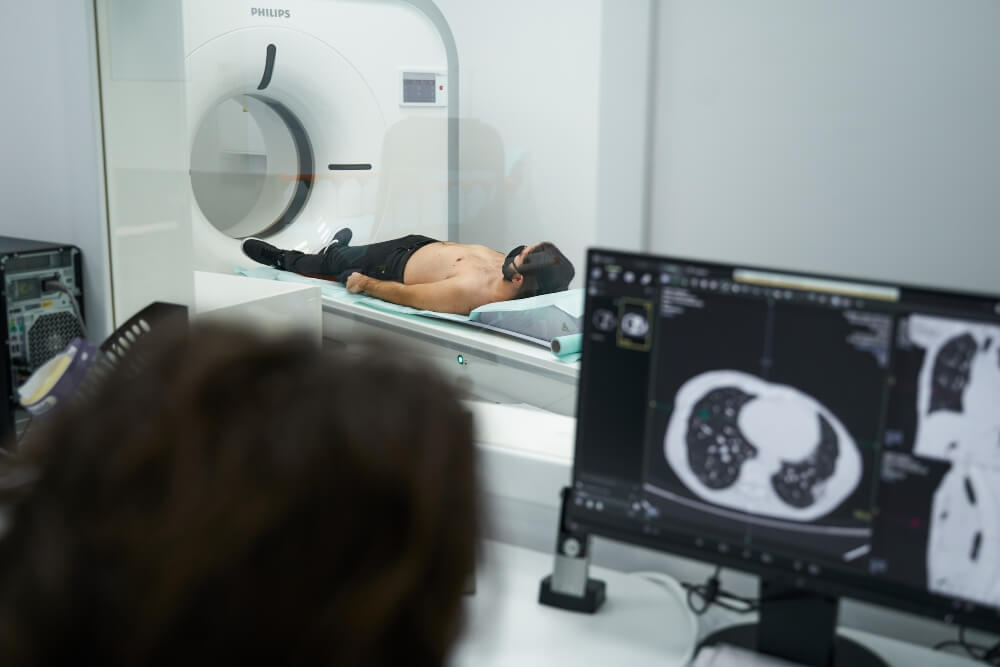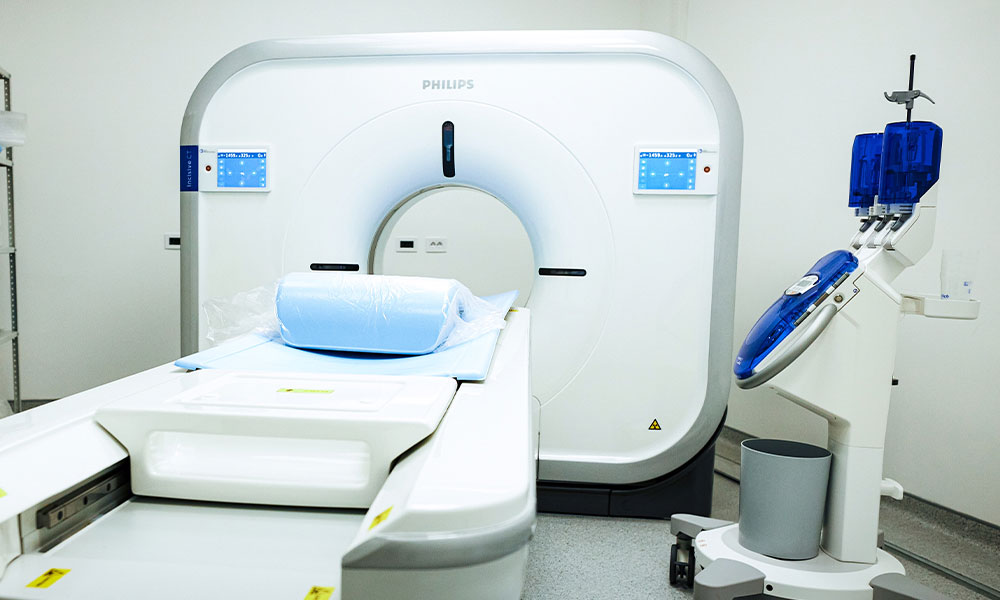What is a Calcium score?
Calcium score is important for assessing the risk of coronary heart disease. It is obtained by measuring the amount of atherosclerotic plaque in the coronary arteries. Atherosclerotic plaque refers to deposits of calcium, fat, cholesterol and dead cell material that accumulate on the walls of blood vessels, causing narrowing and blockages.
Depending on some other factors, such as the patient’s age, the calcium score is finally expressed as a percentage. The lower the percentage, the less likely that person will have a heart attack or similar problem compared to other people of the same age.
What is a Coronary Calcium score test?
This is a non-invasive diagnostic method, as it involves the use of a CT scanner to image blood vessels and measure plaque in them. It can also be found under the names: coronary artery calcium assessment test, coronary calcium score or heart scan.
By scanning the heart in this way, it is possible to see if there is plaque in the coronary arteries, how much of it and how much calcium is in it, which other non-invasive methods cannot offer.
After this test, the cardiologist gets a clear insight into the condition of the patient’s coronary arteries, after which he decides whether additional tests, intervention, treatment or just correction of lifestyle habits are needed.
In the Pulse Cardiology Center, it is possible to perform all the necessary tests for diagnosing heart diseases, as well as interventions if they are recommended.

How we do Ca score test?
Determination of the calcium score is performed with a CT or MSCT scanner. On the images obtained in this way, the plaque and the amount of calcium in it are well detected. In fact, the amount of calcium will be a measure of the plaque in the heart arteries. Calcium appears on a CT scan as light spots that can be counted.
During the examination, the patient lies on a movable bed, which can be pulled in and out of a tube-like machine that has openings on both sides. Inside the machine is an x-ray machine that rotates and takes many detailed pictures.
The examination itself does not take long, and it provides important information about the condition of your coronary arteries and heart.
For this type of scan, it is not necessary to give a contrast agent.
Why is the Ca score determined?
It is necessary to determine the Ca score in order to know exactly whether the patient has coronary artery disease and whether he has a predisposition for the development of this type of disease.
In some people, symptoms will appear which will be a signal that such a test is necessary, while in others the symptoms will be absent or will appear in an already advanced stage.
The most common reasons for using this diagnostic method are:
- high blood cholesterol
- hereditary factor
- diabetes
- high pressure
- obesity
- low physical activity
- smoking
Who is a candidate for the calcium score test?
Anyone who has a moderate risk of developing cardiovascular disease or has a genetic predisposition.
Who is not a candidate for the calcium score test?
- people with a low risk of developing coronary diseases, because exposure to this type of examination is not necessary
- high-risk persons, because it will not be of great benefit to them, although they are already aware of their position
- to people diagnosed with coronary diseases, because the information will not be new or significant
- men under 40 and women under 50
- pregnant women, due to radiation
Test results – calcium score value
The results of the test will be communicated to you by the radiology specialist who will also manage the imaging. At Pulse Cardiology Center, top experts and modern technology are waiting for you, leaving no room for mistakes. Accurate, fast and clear diagnostics are our priority.
The calcium score value can be different:
- 0 – no plaque and low risk of infarction
- 1 – 10 – this amount of plaque is small, and a person with this score has less than a 10% chance of having a heart attack
- 11 – 100 – this amount of plaque is still small, but it means a milder heart disease and a moderate possibility of a heart attack. The cardiologist will probably recommend you to change your lifestyle, get rid of bad habits, vices, more physical activity.
- 101 – 400 – this amount of plaque is moderate, but heart disease exists as well as a moderate to high chance of a heart attack occurring. Treatment will be necessary, and additional tests may be required.
- 401 and more – a large amount of plaque is involved, and the chance of a heart attack is 90%, which is extremely dangerous and requires urgent treatment, additional testing and close monitoring of the situation.
Is the calcium score test reliable?
This is a reliable diagnostic method, it is painless and non-invasive, and it is actually the only non-invasive method that can provide such valid results important for the treatment of coronary diseases.
Calcium score – safe test or not?
During this examination, the patient will be exposed to radiation that is higher than during an ordinary X-ray. For this reason, not everyone will be referred for a calcium score test. The doctor will assess whether it is necessary for establishing a diagnosis, whether any other tests come into play and will give you a referral only if you are a good candidate for it. In that case, the potential danger of exposure to radiation will be negligible in relation to the benefit of the heart scan.
In addition, the scan will not take long and you will only be exposed to radiation for as long as necessary. We take great care of this.
Leave the assessment of the condition and necessity of this method to our team. Rest assured that this test is safe with us.
What are the advantages of this test?
- painless
- non-invasive
- fast
- accurate and reliable
Can a calcium score test be replaced by another test?
Which test will be needed depends on the patient. Our cardiologists are available for consultation.
If you already have any of the diseases of the heart or other organs, bring your medical documentation. After getting to know your condition, they will recommend which test and which steps are best to quickly diagnose your condition.
There is a possibility that you will be recommended a stress test (ergometry), assessment of risk factors or determination of cholesterol level or some other.
You can make an appointment by phone or by filling out the appointment form on our website.

Prevention of plaque formation
Prevention is actually the most important thing in the fight against heart disease. A healthy life, which implies regular, healthy and high-quality nutrition and physical activity in accordance with the age of the individual, is the solution.
In the diet, it is necessary to avoid saturated and trans fats, because they contain a large amount of LDL cholesterol, which is a component of the plaque that narrows and closes the arteries.
As for physical activity, it does not have to be too intense. Regular walks or brisk walking are sufficient, and running, swimming, aerobics, etc. are preferable, depending on the age and capabilities of the person. Ideally, appropriate physical activity lasts between half an hour and an hour each day.
As difficult as it may seem to make time for preventive examinations, remember that it is better to skip another obligation than the obligation you have to your health, especially to your heart. Heart diseases are among the most common and fatal in our country, but also in the world, precisely because of late detection and untimely treatment.
Clogging of the coronary arteries and heart attack as a consequence of this is also possible to predict and prevent.
Whether you need a preventive or urgent examination or intervention, we are here for you.





